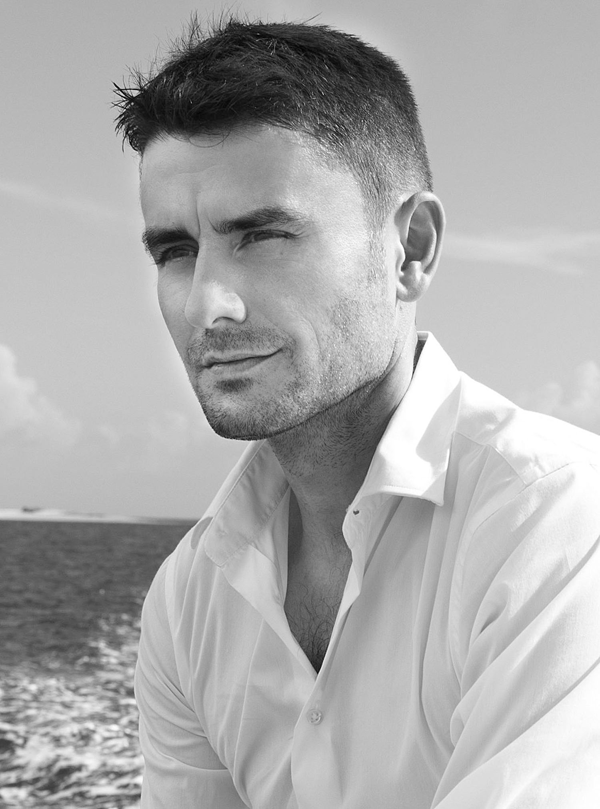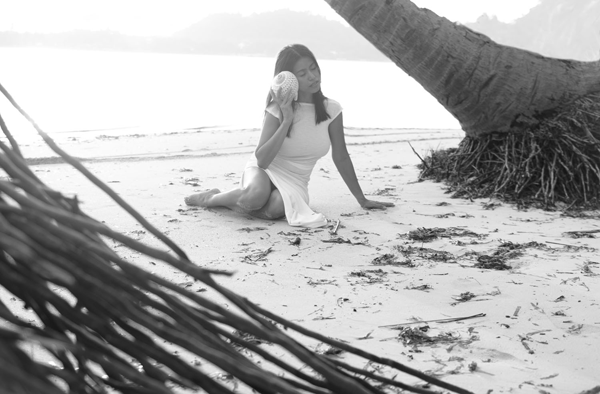The story of Hervé Lampert and his wife Tess is a story of lives as intertwined as the DEDON story is to Cebu. Perhaps the love story of the dynamic couple, with Tess being the wife of the CEO, could arguably be the unseen force that makes DEDON and Cebu a successful match.

I first met Tess through my dear friend Jun Escario at a birthday lunch at Anzani’s. Without uttering a word, she reveals something extraordinary about herself with her soulful almond eyes. As I gazed into them that time, I already thought, “This lady is special,” and then hoped that we both could find the time for more than a mere chit-chat.
The next time I saw her was at the Red Cross Ball at Makati Shangri-La. She was wearing a beautiful gown created for her by her close friend Cary Santiago. With such a huge crowd and all the champagne served that evening, all we managed to talk about was the DEDON showcase in the Salone de Mobile that I attended last year in Milan. It was a short conversation before we said our pleasant goodbyes.
Then, at Zee Lifestyle’s Black and Bling party at the Rizal Library, I saw Tess again and this time with her dashing husband Hervé. I couldn’t help admire how beautifully in sync they were on the dance floor. They were like yin and yang as they swayed their bodies in harmony to whatever genre of music was playing— from the 70s disco, to tango and mambo.
“We met in Mi Vida, a dance club in Cebu, more than a decade ago,” Hervé recalls with a smile. The unexpected meeting led to another evening of music and dance.
“I did not waste anytime,” remembers Tess with laughter. “I invited him to celebrate my birthday with me in an intimate dinner.” Apparently, the moment they first hit the dance floor, they never stopped dancing—eventually to the rhythm of life as they became man and wife. Finding each other in Cebu was the beginning of living in paradise for both Hervé and Tess.
Hervé Lampert grew up on a farm in France. Even at an early age, he dreamt of running a business his own way. He worked shortly in the Marketing Division of an American company in Paris whilst still finishing his business degree from the Graduate School for International Business Administration in Strasbourg. In 1997 he met Bobby Dekeyser, the founding chairman of DEDON and moved to Lüneburg, Germany to help build the company.

In 2000, at the age of 24, he made a big leap into unknown territory and moved to Cebu, to set up DEDON’s manufacturing facility, which would address the recurring problems with quality in the company.
Hervé confesses, “It was the hardest in the beginning because of the trust we gave to this couple who was supposedly our partner in building the company but who failed us in more ways than one.” Nonetheless, he looks back with pride at how challenges became opportunities for him to move on and succeed. His secret in life, he says, is “living with passion and inspiration.”
Starting with seven employees, Hervé saw the growth of DEDON Cebu within a span of 8 years, providing fair and gainful employment to 3,600 employees in a part of the world where such ethical practice is an exception rather than the rule. He is the force behind DEDON’s commitment to their employees and their social responsibility. But for the record, DEDON is not comfortable with the term ‘Corporate Social Responsibility’ or CSR.
‘’For one thing, we don’t think of ourselves as particularly corporate,” Hervé says. “‘Corporate social responsibility’ can sound like a PR obligation—something a company does because it’s expected to—whereas at DEDON, positive social action is an everyday expression of our culture.
“There are certain values, such as respecting others, that we hold in our own lives,” he explains, “so why shouldn’t they be the foundation of the organization as well? When you look, for example, at the work people do here in Cebu—the time they spend, the processes involved, the beauty they create—you have to respect it by allowing them to share in the success of the organization.” For Hervé this means not merely complying with local labor standards but, as with everything they do, setting their own standards and continually raising them.
“We’re not in Southeast Asia because it’s cheaper, but because of the competency and skills here, weaving in particular. So for us, it’s natural to show people that we care about them, the same as we do care about our partners everywhere. The respect is real. We’re all part of the same team.”
Hervé’s ultimate commitment nevertheless is to his family. It is the same respect that he accords his team in DEDON that he extends to his partner in life, his wife Tess.

Tess, a true-blue Cebuana, grew up with her lola when her parents separated early on. She recalls her childhood with nostalgia: “My journey in life is very colorful. I’m a lola’s girl. I grew up in a simple life with her but very conservative and religious.’’
She admits that as she was growing up, life was never easy, but then she also never saw her cup as half empty nor half full; instead, to her, it was always more than enough.
“I never complained,” she says. “I accept things as they are and do my best to make things better.’’ It is this positive outlook in life that makes Tess extraordinary.
“It was a dark period in my life when I met Hervé. I was just healing from a previous relationship that had scarred my inner core.’’ The most colorful part of her past had made her the woman that she is today—confident, certain, committed, and passionate.
But what I find most fascinating and inspiring is how Tess talks honestly about her life lessons and how, despite all the moments that she was down and broken, she was able to keep her heart whole.
Though she never pursued her career as a nurse, so she can be there for her family, she feels that being a mother is her most important role to date. Hervé and Tess have two beautiful girls, Veia who is six, and Maori who is four. The Lamperts are a typical family; Hervé is the doting father who insists that the girls clean up after their toys, while Tess enjoys dressing them up. With a mixed background, conversations in the family slide effortlessly from English to French and Visayan, and meals are a hodgepodge of croissants, pasta, and bangus with rice. The girls’ nanny, Dorothia Galolo, has been employed by Hervé since he was a bachelor and she is a valuable member of the family already. Tess, however, is in her element at the kitchen where she can whip up French and Filipino dishes befitting even, the French ambassador.
Quite the multi-tasker, Tess continues to pursue her other passions as she fully embraces the roles of being a mother and a wife. Currently, she is wrapping up two special projects that she also considers her two babies. One has required her creative instincts in transforming an old house that they purchased four years ago into a French country home. Her constant travels to France, Hervé’s first home, have exposed her to the authentic colors and textures of the homes outside of Paris.

When the tenants vacated a property that they own in Maria Luisa, Tess immediately got the idea of doing a total makeover, not just with the structure of the house but also its interiors, furniture and fixtures included. The result is an elegant French country home with gray walls with white detailing.
Tess proudly shares her feat. “I am very happy with this project. I poured into it blood and sweat looking at every single detail till the entire process of renovation finally paid off. Now I can’t wait to bring in the furniture to finally complete the transformation.”
The other “baby” of Tess is something even more special—the most anticipated DEDON Island Resort in Siargao island in Mindanao. January and February had been the most intense for the Lamperts preparing for this.
“Dedon will offer its services as bespoke travel—from limo service at your city of origin, to a stopover in Cebu where we have chosen abaca as our partner, or in Manila, whatever the guest prefers,” Hervé points out.
Indeed, the site’s remoteness makes it a truly private island. Although the local government has taken notice and has built a sparkling new airport there, and a local airline might increase its number of flights as well, the resort will still operate in the strictest sense of exclusivity, dictated mainly by a price range that makes it prohibitive except to a few who can splurge its four-figure euro daily rate. The island houses nine private villas, which can accommodate 24 guests at a time.
Taking the Friday shuttle to Siargao almost weekly, it has been Tess’s job to usher a team of French architects and designers ever since the resort was acquired from its previous owner, Nicholas Rambeau. Tess, who speaks the local dialect, was tasked with the Herculean job of polishing the existing structure, as well as augmenting it with four new villas, into DEDON luxe. It involves the entire DEDON team to actualize this project, including Hervé’s brother Vince Lampert, who is responsible for creating all the special DEDON product exclusive only to the resort and who also serves as the Managing Director of DEDON. Tess is only more than happy to get her creative hands into the project. She has also taken time to travel from Cebu to different parts of the country in order to discover artisan products that she can integrate into the lifestyle of the resort. We are not just talking about furniture here.
When the company pursued the philosophy behind the name which goes beyond the indoor and outdoor furniture that they are known for, a bigger idea came to life—DEDON Places.
“DEDON Places is a budding collection of one-of-a-kind accommodations around the world,” DEDON founding chairman Bobby Dekeyser says, “each with its own outdoor orientation, from a ski chalet to an island hideaway, an African wilderness lodge, a tree house, an igloo, a boat or a city harbor hotel.

“In many ways, these accommodations are a reflection our company’s nomadic spirit,” he explains. “Because we’re always on the move, meeting up with partners, team members, and friends in so many different parts of the world, we’re always discovering incredible places. Now we want to let others know about them and share the experience, too.” And the first to open in this direction will be DEDON Island Resort on Siargao Island in the Philippines.
“Remote and exotic, with clear blue waters and lush tropical flora, it’s a destination we’ve been visiting for a decade,” Bobby Dekeyser says. “Having acquired it earlier this year, a group of 30 of us, including the celebrated designer and DEDON collaborator Jean-Marie Massaud, his architectural partner Daniel Pouzet, and their families, spent 14 days living on the island. Based on our shared experience there, Jean-Marie and Daniel are adapting the property to match the vision of DEDON Places.” Massaud is known for his contemporary minimalistic and at times futuristic furniture such as the Aspen Sofa from Casinna and the Kennedee Modular Sofa which he design for Poltrona Frau. Together, they designed the architecture behind the Chivas Stadium in Guadalajara, Mexico. Both are currently the in-house designers of Dedon.
And this is where the journey of Tess to paradise continues. ‘’I have made Siargao my second home,” she says, “ever since we started developing the DEDON Island Resort. After the French architect Jean-Marie Massaud and his partner Daniel Pouzet worked on the amazing architectural design of the entire resort, it is now all in my hands to complete the picture. From the purchasing of every minute detail to personally hiring and training the staff and immersing our foreign staff into the local culture, my heart and soul are involved.’’
More importantly, she has helped increase the environmental awareness of both the locals and the resort management—to ensure their commitment to creating and preserving an ecological consciousness that would be a way of life not just in the resort but in the rest of the island as well. After all, in her very words, ‘’Siargao is more than a surfing capital of the country. It is paradise!’’
written and produced by Melo Esguerra photography locale DEDON Island





